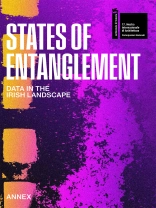Investigates how data production and consumption territorialize the physical landscape filtered through Ireland’s role in global communications and, as told by the Irish Pavilion at the 2021 Venice Architecture Biennale, features an installation that focuses on the materiality of data infrastructure in space.
As our everyday lives become increasingly entangled with data technologies, the book addresses the utopian fantasy that surrounds the Cloud, as transcending physical presence or resourcing. By bringing the physical infrastructure around data, and its impact on the environment under the spotlight, it hopes to reframe how we understand data production and highlight the myth that information technologies are hidden and without major material manifestations on the landscape.
The context for the book is Ireland which has a significant historical role in the evolution of global communications and data infrastructure. In 1866, the world’s first transatlantic telegraph cable landed on the West coast of Ireland. In 1901, the inventor of the radio Guglielmo Marconi transmitted some of the world’s first wireless radio messages from Ireland across the Atlantic Ocean to Newfoundland. Today, Dublin has overtaken London as the data centre hub of Europe, hosting 25% of all available European server space. And by the year 2027, data centres are forecast to consume a third of Ireland’s total electricity demand.
The book aims to raise awareness around the hardware of the global internet and Cloud services, which is interwoven with the Irish landscape—made manifest through the vast constellation of data centres, fibre optic cable networks, and energy grids that have come to populate its cities and suburbs over recent decades.
The publication accompanies and supports Entanglement, the Irish Pavilion at the 17th Venice Architecture Biennale by archiving the production of the pavilion filtered through a series of poetic excerpts that describe the form, components, content and furniture that make up the installation. At the same time the book is conceived as more than just a catalog by positioning some of the cultural and spatial implications of data technologies in Ireland within a more universal context through contributions by ANNEX, the team selected to produce the pavilion, as well as invited contributors from the disciplines of Media Theory; Journalism; Computer Science, Geography; History and Architecture.
A propos de l’auteur
Donal Lally is an architect and principal at zero-degree machine [z-dm], anarchitecture studio that operates in areas within and beyond the traditional boundaries of architecture, landscape and urbanism. Donal is a Lecturer in Design Theory at TU Dublin. Donal’s Ph D project, titled The Posthuman City, explores how data infrastructures reconfigure human and non-human habitats.












